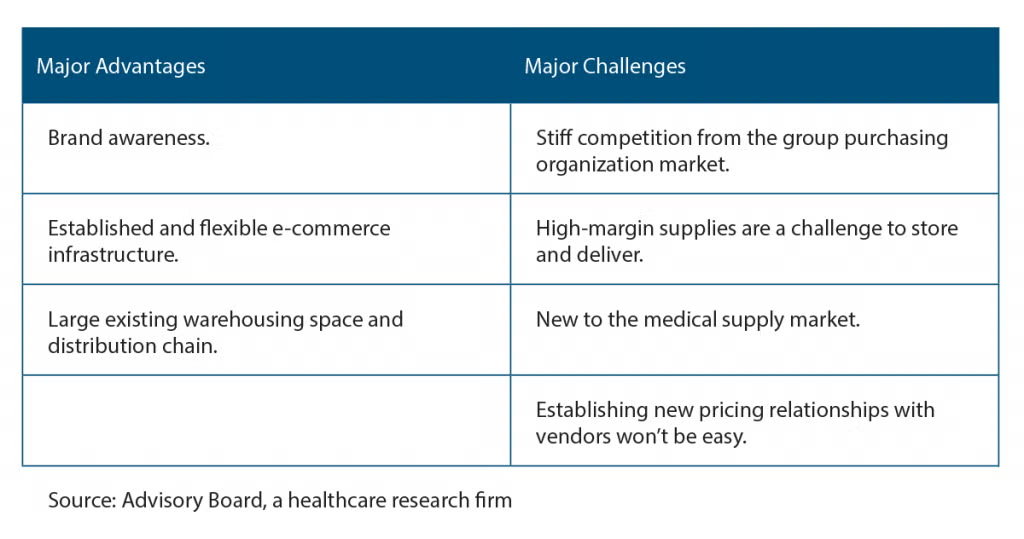
© dennizn; Nikolayev Alexey / shutterStock.com
E-commerce titan Amazon.com has recently stepped into the medical and surgical supplies business, and its reputation for low prices and speedy delivery (free with orders higher than $49) could step on the toes of your medical supply representative.
This is not something that especially excites Ralph Marrero, MD, an otolaryngologist with Central Arkansas Ear, Nose, and Throat Clinic. “When you get to know the rep, you hate to say one day, ‘Oh hey, we’re not going to be seeing you anymore, even though you were doing a great job and we really like you and we hope you don’t starve,’” he said.
Dr. Marrero has worked in this small practice of two physicians, an audiologist, and an office manager since 2010. His office made a switch to a new supplier their previous supplier made multiple errors and failed to deliver supplies in a timely fashion. The office staff and nurses were happy with the new supplier. “It’s a big company that offers a lot,” he said.
One concern Dr. Marrero expressed about switching to Amazon Business is that if his practice left his current supplier, they might lose their preferential pricing level with the company, which is based on the number of years he’s been a customer and the number of products he’s ordered. “It’s kind of like frequent flier miles,” he said. “If you all of a sudden switch to another airline for one great fare, well, that’s great, but now you’re paying top shelf prices and not the business prices you were paying before.”
Additionally, he appreciates the fact that when his practice left their previous supplier, the new company gave them the corresponding preferential pricing level so they didn’t miss a beat on the discount they were receiving. Another concern for Dr. Marrero is the possibility of feeling like “a tiny ant in the massive hill of Amazon.” He’s happy with the attention his small practice gets from his current supplier, particularly in light of the difficulty they had with their previous one. “We’d be inclined to stick with what we’ve got,” he said. “Unless we hear Amazon is delivering on magic carpets for next to nothing.”
We’re always looking to limit overhead costs because we’re getting squeezed on the revenue side from reduced reimbursements and a more competitive market. Anything we can do to reduce overhead costs from the business side—whether on office or medical supplies—is definitely something we like to do. —Maxwell Furr, MD
Competitive Pricing
Maxwell Furr, MD, of PDX ENT & Audiology in Portland, Ore., on the other hand, said he would be willing to give the Amazon Business platform a try. He hadn’t realized Amazon had entered the medical supplies business until he read in Fortune magazine last spring that the internet giant was considering a venture into the pharmaceutical market (a consideration that is still underway), as well as a foray into medical supplies.
Dr. Furr’s rep stops by regularly and has been helpful in finding instruments for new sinus procedures and special injection supplies, like microcannulas, for his cosmetics procedures when he was having difficulty determining which were the most established products. However, like small businesses of any type, small practices aren’t as likely to get the kind of high-volume discounts that larger practices can get, and cost cutting wherever possible is often a major consideration.
And there are other reasons for cost cutting. “We’re always looking to limit overhead costs because we’re getting squeezed on the revenue side from reduced reimbursements and a more competitive market as far as insurance [goes],” Dr. Furr said. “Anything we can do to reduce overhead costs from the business side—whether on office or medical supplies—is definitely something we like to do.”
Most of all, Dr. Furr would be very interested if Amazon got into the distribution of hearing aids and could provide cost savings on those devices. “The overall cost to us of those sorts of purchases is much greater than for any amount of gauze or tongue depressors,” he said.
Phillip Scott Ballinger, MD, an otolaryngologist with ENT Associates of Alabama, PA, a three-physician group based in Montgomery, said he has no problem using Amazon for medical supplies, because he already uses them for printer ink at the office, as well as his personal shopping.
“Medical supplies aren’t cheap, and anything to contain cost is good,” he said. “I am a little concerned, however, about sales tax not being collected,” he added. “I know a few years back in Arkansas, they went around and assessed all the dentists for sales tax they didn’t pay by buying supplies online.”
Healthcare experts expect Amazon Business may do some damage to the medical supplies industry. However, a lot may depend on how indispensible medical supply sales reps have made themselves to the clinics they serve.
Renée Bacher is a freelance medical writer based in Louisiana.
